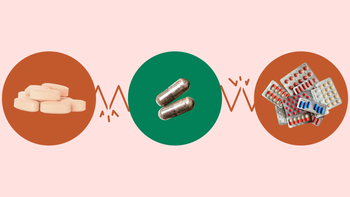
The 9 Best Supplements to Improve Brain Health: What the Science Says
Key takeaways:
There’s no magic pill for memory and cognition, but several supplements may help improve brain health.
If you have low levels of vitamin D, B12, or zinc, taking vitamin supplements can improve your memory and thinking skills.
Some supplements — like omega-3 fatty acids and curcumin — might help brain health even if your levels aren’t low.
Table of contents

There’s no shortage of supplements aimed at optimizing health and physical performance. But what about brain performance? Can certain supplements help you think more clearly, improve your concentration, and even help you remember where you parked your car?
It turns out there are several options on the market that may help. From vitamins and minerals to herbs and antioxidants, the choices can be overwhelming. Your body uses multiple nutrients to keep your brain firing on all cylinders. But when it comes to which supplements have been shown to boost brain health, the research can be confusing to sort through. We’ll break down what the science says on these top 9 supplements for brain health.
1. Omega-3 fatty acids
What is it? Omega-3 fatty acids are a type of polyunsaturated fat with anti-inflammatory properties. They play an important role in brain development and function. Omega-3 deficiency has been associated with several conditions related to brain function, such as dementia and attention-deficit hyperactivity disorder (ADHD).
Stay healthy with CVS
Shop the brands you trust at CVS. Whether it’s wellness or beauty, get what you need at great prices.

What’s the evidence? Omega-3 fatty acids may help a few different measures of brain health, like better memory and attention:
One review of multiple studies found that omega-3 fatty acids improved learning, memory, and blood flow to the brain.
Another review observed that children with ADHD who took omega-3 supplements had improved attention, memory, and behavior.
When it comes to dementia, some research suggests omega-3s may help protect the brain from age-related cognitive decline compared to a placebo. This is especially true for people with a family history of dementia and current memory problems.
What are the side effects? The most common side effects are gastrointestinal symptoms like nausea, upset stomach, heartburn, and “fish burps.” Omega-3s can also affect pathways involved in blood clotting. This doesn’t seem to cause any problems in healthy people. But if you take any blood-thinning medications, talk to your prescriber before starting an omega-3 supplement. They may recommend extra monitoring or different dosing.
How much do you take? The best dose for brain health isn’t yet known. But a typical recommendation for DHA and EPA combined is 1 g to 2 g (1,000 mg to 2,000 mg) per day. The FDA recommends not exceeding 5 g (or 5,000 mg) per day.
Worth a try? Yes. There’s a solid amount of evidence to suggest omega-3 fatty acids are beneficial for brain health. And you’re unlikely to experience any serious side effects.
2. Vitamin D
What is it? Vitamin D is a vitamin that we can get from both sunlight and food. Vitamin D deficiency has been linked to a variety of chronic diseases, including depression and dementia.
What you eat affects your brain health. Certain foods pack more of a punch. Read about 15 foods that may boost memory and focus.
Some daily habits can improve your memory. Mindfulness and brain games can boost your brain health, but they’re not the only ways. These nine simple habits can help keep your memory sharp as you age.
Wondering how to choose the best supplements? Look for third-party testing and follow these tips to make sure you’re choosing the best supplements for you.
What’s the evidence? It’s clear that low levels of vitamin D are linked to worse brain health. People with higher vitamin D levels tend to have better cognitive function. But this doesn’t necessarily mean that taking extra vitamin D will improve brain function:
A large review of 20 randomized controlled trials found no convincing evidence that vitamin D supplements were helpful for healthy people.
Another study also noted that taking vitamin D doesn’t seem to help cognitive function in people with Alzheimer’s disease.
But not all the research agrees. The following year, a larger study found that older adults who took vitamin D supplements were 40% less likely to develop dementia over the next 10 years. And the effects were stronger in women.
Read more like this
Explore these related articles, suggested for readers like you.
What are the side effects? Not many side effects have been reported when taking normal doses of vitamin D (see below). But taking too much Vitamin D can lead to general symptoms like weakness, fatigue, low appetite, and bone pain.
How much do you take? The daily recommended amount is 600 IU. But the right dose depends on why you’re taking it and your baseline vitamin D level. Many folks can safely take between 2,000 IU and 3,000 IU of Vitamin D daily. A blood test can determine if your level is low. And your healthcare team can help you find the right dose.
Worth a try? It depends. If your vitamin D levels are low, supplementation is important. If you’re older and female, you may benefit from taking vitamin D to maintain brain health as you age. But for all others, there isn’t enough evidence to recommend vitamin D specifically for brain health.
3. Vitamin B12
What is it? Vitamin B12 is a water-soluble vitamin that helps keep brain cells healthy. Since it’s mostly found in animal-based products, people following a plant-based diet should take a B12 supplement.
What’s the evidence? Low vitamin B12 levels have been linked to progressive cognitive problems and brain disorders like Alzheimer’s, dementia, and Parkinson’s disease. If you have dementia and a B12 deficiency, supplementing with vitamin B12 may help reverse some of your dementia symptoms.
Studies have found that taking vitamin B12 can improve memory and focus in those who have low B12 levels. But if your vitamin B12 levels are normal, taking extra supplements is unlikely to affect brain health or cognition.
What are the side effects? There aren’t too many side effects to taking B12 orally. Injectable B12 is more likely to cause allergic reactions like rashes and itching. Since B12 is a water-soluble vitamin, your body will get rid of any excess through your urine.
How much do you take? Most folks who eat animal products, including meat and dairy, get enough B12 through their diet. If you’re vegan or vegetarian and require a supplement, 2.4 mcg per day is the recommended daily amount.
Worth a try? Probably not, as long as your B12 levels are normal. But if your diet is mostly or only made up of plant-based products, B12 supplements can be helpful for your overall health, including brain health.
4. Zinc
What is it? Zinc is a mineral found in animal products like beef, oysters, and eggs. It’s also found in plant-based foods like nuts, seeds, and even breakfast cereals. It’s essential for cell signaling and helps brain cells communicate with each other.
What’s the evidence? While zinc is important for healthy brain function, both too little and too much can cause problems. Zinc deficiency is linked to problems with memory and learning. But in special cases — like strokes or seizures — too much zinc can actually damage brain cells. For healthy cognitive function, it’s all about getting that healthy middle ground.
When it comes to supplementing with zinc, studies are mixed, and primarily focused on children:
One study found that children who took zinc had better scores on tests measuring thinking ability and attention.
Other studies didn’t show any improvement in learning abilities for kids treated with zinc.
In adults, the evidence is also conflicting. For example, one study found that adults who took zinc supplements had better spatial memory but worse attention scores.
What are the side effects? Taking too much zinc may cause dizziness, nausea, vomiting, and lack of appetite. Take the amount recommended by your physician on a full stomach, to minimize any gastrointestinal symptoms. Zinc can also interfere with copper absorption if taken in doses higher than recommended.
How much do you take? For adults, the daily recommended amount of zinc is 11 mg for men and 8 mg for women. Adults shouldn’t take more than 40 mg per day. For children and adolescents, the maximum daily dose is lower, so talk with their pediatrician if you’re thinking about starting a zinc supplement for your child.
Worth a try? Probably not. If you’re low in zinc, supplementing can be helpful. But there isn’t enough evidence to recommend starting a zinc supplement if your levels are normal.
5. L-theanine
What is it? L-theanine is an amino acid found in tea, known for its calming effect. It also has antioxidant and anti-inflammatory activity, so research has focused on learning more about potential health benefits.
What’s the evidence? L-theanine shows promise for improving both mood and memory. One randomized control trial compared L-theanine to a placebo. Those who took L-theanine experienced improvements in verbal fluency and executive functioning, along with decreased stress over a 4-week period.
Theanine may also help with attention and working memory. These effects might be stronger in people who are either anxious about test-taking or those who also drink caffeine. But human studies have generally been small, so more research is needed to know when L-theanine might be most helpful.
What are the side effects? No major side effects of L-theanine have been reported. If you consume tea to get your L-Theanine, be mindful of the caffeine content in green tea, which can lead to increased heart rate, anxiety, and jitteriness. But L-theanine itself doesn’t cause caffeine-related jitteriness.
How much do you take? Taking up to 250 mg of L-theanine per day is recognized as safe by the FDA. This is also the amount most clinical trials use when testing its effects on sleep, stress, and anxiety.
Worth a try? Yes. L-theanine might be especially helpful if you feel like your nerves make it harder to think. It’s considered low risk. And if it doesn’t improve your cognitive function, it might still give you a boost in your mood.
6. Choline
What is it? Choline is a nutrient found in highest concentrations in animal products like meat, eggs, fish, and dairy. It’s important for your brain because it helps to regulate mood and memory.
What’s the evidence? The link between choline and brain health is strong. Studies have found that people with higher dietary intake of choline have:
Slower cognitive decline associated with aging
Better brain health after a stroke
Choline is especially important for pregnant women and their baby’s brain development. Most of the research looks at getting choline through diet. But studies using supplements seem promising. One large study found that people who got more than 187 mg of choline per day (from both diet and supplements) had better learning ability, attention, and memory compared to those consuming less.
Choline supplements come in several different forms, such as choline bitartrate, phosphatidylcholine, and lecithin. There aren’t studies comparing which form is best.
What are the side effects? There don’t appear to be many side effects from taking the proper dosage of choline. But excessive amounts of choline can lead to low blood pressure, vomiting, heavy sweating, and a fishy body odor. It could also cause liver damage if you take too much for a long period of time.
How much do you take? Adult women should get about 425 mg of choline per day, while men need 550 mg daily. If you’re starting a supplement, use a lower dose, as these recommendations include choline from food, drinks, and supplements. The safe upper limit for daily intake for adults is 3,500 mg — which includes choline from food, drinks, and supplements. For kids, the recommended dose is lower.
Worth a try? If you’re pregnant, it’s definitely worth a try. For others, the research suggests that it may be worth a try. Just make sure not to exceed the recommended daily dose.
7. Coenzyme Q10
What is it? Coenzyme Q10 (CoQ10) is an antioxidant present in every cell membrane in your body. It helps to protect your body from oxidative stress and has been studied for its potential benefits in:
Heart health
Fertility and egg quality
Reducing fatigue
Improving energy
What’s the evidence? Older adults with higher CoQ10 levels may have better cognitive function and executive functioning skills compared to those with lower levels.
CoQ10 has also been investigated as a possible treatment for different kinds of brain disorders — like Alzheimer’s disease, Parkinson’s disease, and multiple sclerosis. As an antioxidant, it shows promise. Lab and animal studies suggest it may indeed help protect the brain from damage from things like alcohol or nicotine.
But there aren’t many human studies looking at the effect of CoQ10 supplementation on the brain. And the ones that do exist tend to be mixed. So, it’s too soon to say if supplements can boost brain health.
What are the side effects? Most side effects of CoQ10 are mild and can include nausea and difficulty sleeping. However, it can interfere with insulin and blood thinners like warfarin (Coumadin). So, reach out to your prescriber before starting a supplement.
How much do you take? In clinical trials, most doses range from 100 mg to 600 mg per day. If you’re taking more than 100 mg daily, it’s often recommended to divide the total amount into 2 to 3 smaller doses to make it more effective.
Worth a try? It’s worth considering, but there aren’t enough human studies to know if it could be helpful for cognitive function.
8. Resveratrol
What is it? Resveratrol is a polyphenol found in grape skin and seeds. Polyphenols are plant antioxidants that, when eaten, can help protect your body from age-related damage. Resveratrol is the compound that gives red wine a health-boosting edge compared to other alcoholic beverages.
What’s the evidence? There’s solid evidence that resveratrol benefits brain function in animals, but studies in humans are mixed.
Some studies found no significant benefits from taking resveratrol, while others showed that post-menopausal women who took resveratrol for a year experienced improvements in cognitive function and verbal memory. These differences could be due to factors like the dose given, how long it was used for, or the age and sex of those who benefit most. Researchers are still working to understand when and for whom resveratrol supplements could be most helpful.
What are the side effects? Resveratrol appears to be safe, with minimal reported side effects at short-term doses around 1 g per day in healthy individuals. But at doses of 2.5 g per day, side effects like nausea, diarrhea, vomiting, and liver problems in people with liver disease are more likely to occur.
How much do you take? There are no official guidelines for resveratrol to treat health conditions. This makes it hard to know what the “right” dose is. Most clinical trials have used doses ranging from 75 mg to 500 mg daily. Research suggests that a dose of up to 1,000 mg (or 1 g) per day is safe.
Worth a try? It may be worth a try. Resveratrol is considered safe and low risk at low doses. And for post-menopausal women it has been found to be helpful. But for other groups of people, the evidence is lacking.
9. Curcumin
What is it? Curcumin is a compound found in turmeric, a spice commonly used in Indian cooking. It has anti-inflammatory properties, and its antioxidant effects may also protect the brain against neurodegeneration (degrading of brain cells) in conditions like Alzheimer’s disease.
What’s the evidence? Several studies have shown that curcumin can improve working memory, mood, attention, and reduced perceived fatigue. One study also found that participants who took curcumin had fewer plaques in the region of their brain associated with mood and memory, which tend to be higher in those with Alzheimer’s Disease.
What are the side effects? Side effects are uncommon but may include skin inflammation (dermatitis) and an upset stomach.
How much do you take? The Allowable Daily Intake (ADI) for Curcumin is up to 3 mg per kilogram of body weight. So, someone who weighs 150 lbs (68 kg) can take up to 200 mg of curcumin daily.
Worth a try? Yes. Curcumin is a relatively low-risk spice that might boost your mood and cognitive function. If you have underlying arthritis, you might also find that it helps lower your pain.
The bottom line
A wholesome diet can provide plenty of nutrients essential for your brain health. When your diet falls short, certain supplements might help fill in those nutritional gaps. If you have low levels of vitamin B12, zinc, or vitamin D, starting supplements may help you boost your brain health. Other supplements — like omega-3 fatty acids, curcumin, and L-theanine — might also help with cognition, even if your levels are normal. If you’re thinking of starting supplements for brain health, reach out to a trusted healthcare professional for guidance on which supplements and dosages might be best for you.
Why trust our experts?



References
Ahmadi-Soleimani, S. M., et al. (2024). Oral administration of coenzyme Q10 ameliorates memory impairment induced by nicotine-ethanol abstinence through restoration of biochemical changes in male rat hippocampal tissues. Scientific Reports.
Al Amin, A. S. M., et al. (2023). Vitamin B12 (cobalamin). StatPearls.
Asif, A., et al. (2023). Vitamin D toxicity. StatPearls.
Baba, Y., et al. (2021). Effects of L-theanine on cognitive function in middle-aged and older subjects: A randomized placebo-controlled study. Journal of Medicinal Food.
Bagheri, S., et al. (2023). Neuroprotective effects of coenzyme Q10 on neurological diseases: A review article. Frontiers in Neuroscience.
Beauchet, O., et al. (2021). Vitamin D supplementation and cognition in adults: A systematic review of randomized controlled trials. CNS Drugs.
Benameur, T., et al. (2021). New promising therapeutic avenues of curcumin in brain diseases. Molecules.
Black, M. M. (2023). The evidence linking zinc deficiency with children's cognitive and motor functioning. The Journal of Nutrition.
Chakkera, M., et al. (2022). The efficacy of vitamin D supplementation in patients with Alzheimer's disease in preventing cognitive decline: A systematic review. Cureus.
Choi, S., et al (2020). Zinc in the brain: Friend or foe? International Journal of Molecular Sciences.
Cox, K. H. M., et al. (2020). Further evidence of benefits to mood and working memory from lipidated curcumin in healthy older people: A 12-week, double-blind, placebo-controlled, partial replication study. Nutrients.
Derbyshire, E. (2018). Brain health across the lifespan: A systematic review on the role of omega-3 fatty acid supplements. Nutrients.
Dighriri, I. M., et al. (2022). Effects of omega-3 polyunsaturated fatty acids on brain functions: A systematic review. Cureus.
Fernández-Portero, C., et al. (2023). Coenzyme Q10 levels associated with cognitive functioning and executive function in older adults. The Journals of Gerontology.
Ghahremani, M., et al. (2023). Vitamin D supplementation and incident dementia: Effects of sex, APOE, and baseline cognitive status. Alzheimer's & Dementia: Diagnosis, Assessment & Disease Monitoring.
Haskell, C. F., et al. (2008). The effects of L-theanine, caffeine and their combination on cognition and mood. Biological Psychology.
Hewlings, S. J., et al. (2017). Curcumin: A review of its effects on human health. Foods.
Hidese, S., et al. (2019). Effects of L-theanine administration on stress-related symptoms and cognitive functions in healthy adults: A randomized controlled trial. Nutrients.
Higashiyami, A., et al. (2011). Effects of L-theanine on attention and reaction time response. Journal of Functional Foods.
Huang, F., et al. (2024). Dietary choline intake is beneficial for cognitive function and delays cognitive decline: A 22-year large-scale prospective cohort study from China health and nutrition survey. Nutrients.
Jaiswal, A., et al. (2023). Choline supplementation in pregnancy: Current evidence and implications. Cureus.
Jatoi, S., et al. (2020). Low vitamin B12 levels: An underestimated cause of minimal cognitive impairment and dementia. Cureus.
Jiménez-Jiménez, F. J., et al. (2023). Coenzyme Q10 and dementia: A systematic review. Antioxidants.
Lange, K. W. (2020). Omega-3 fatty acids and mental health. Global Health Journal.
Li, M., et al. (2022). L-theanine: A unique functional amino acid in tea (Camellia sinensis L.) with multiple health benefits and food applications. Frontiers in Nutrition.
Li, Z., et al. (2023). The important role of zinc in neurological diseases. Biomolecules.
Liu, L., et al. (2021). Choline intake correlates with cognitive performance among elder adults in the United States. Behavioral Neurology.
Markun, S., et al. (2021). Effects of vitamin B12 supplementation on cognitive function, depressive symptoms, and fatigue: A systematic review, meta-analysis, and meta-regression. Nutrients.
Maylor, E. A., et al. (2007). Effects of zinc supplementation on cognitive function in healthy middle-aged and older adults: the ZENITH study. British Journal of Nutrition.
Moore, E., et al. (2012). Cognitive impairment and vitamin B12: A review. International Psychogeriatrics.
Nakazaki, E., et al. (2021). Citicoline and memory function in healthy older adults: A randomized, double-blind, placebo-controlled clinical trial. The Journal of Nutrition.
National Institute of Diabetes and Digestive and Kidney Diseases. (2024). Turmeric. LiverTox: Clinical and Research Information on Drug-Induced Liver Injury.
Office of Dietary Supplements. (2022). Choline: Fact sheet for consumers. National Institutes of Health.
Office of Dietary Supplements. (2022). Choline: Fact sheet for health professionals. National Institutes of Health.
Office of Dietary Supplements. (2022). Omega-3 fatty acids: Fact sheet for consumers. National Institutes of Health.
Office of Dietary Supplements. (2022). Zinc: Fact sheet for health professionals. National Institutes of Health.
Office of Dietary Supplements. (2023). Vitamin B12: Fact sheet for consumers. National Institutes of Health.
Office of Dietary Supplements. (2024). Vitamin B12: Fact sheet for health professionals. National Institutes of Health.
Office of Dietary Supplements. (2024). Vitamin D: Fact sheet for health professionals. National Institutes of Health.
Poly, C., et al. (2011). The relation of dietary choline to cognitive performance and white-matter hyperintensity in the Framingham Offspring Cohort. The American Journal of Clinical Nutrition.
Salehi, B., et al. (2018). Resveratrol: A double-edged sword in health benefits. Biomedicines.
ScienceDirect. (n.d.). Theanine.
Shea, M. K., et al. (2021). Brain vitamin D forms, cognitive decline, and neuropathology in community-dwelling older adults. Alzheimer's & Dementia.
Small, G. W., et al. (2018). Memory and brain amyloid and tau effects of a bioavailable form of curcumin in non-demented adults: A double-blind, placebo-controlled 18-month trial. The American Journal of Geriatric Psychiatry.
Sultan, S., et al. (2020). Low vitamin D and its association with cognitive impairment and dementia. Journal of Aging Research.
Testai, L., et al. (2021). Coenzyme Q10: Clinical applications beyond cardiovascular diseases. Nutrients.
Tu, W., et al. (2023). Does resveratrol improve cognition in humans? A scientometric study to an in-depth review. CNS Neuroscience & Therapeutics.
Welty, F. K. (2023). Omega-3 fatty acids and cognitive function. Current Opinion in Lipidology.
Wightman, E. L, et al. (2015). The effects of chronic trans-resveratrol supplementation on aspects of cognitive function, mood, sleep, health and cerebral blood flow in healthy, young humans. British Journal of Nutrition.
Zaw, J. J. T., et al. (2021). Long-term effects of resveratrol on cognition, cerebrovascular function and cardio-metabolic markers in postmenopausal women: A 24-month randomized, double-blind, placebo-controlled, crossover study. Clinical Nutrition.
Zhong, C., et al. (2021). Choline pathway nutrients and metabolites and cognitive impairment after acute ischemic stroke. Stroke.





























